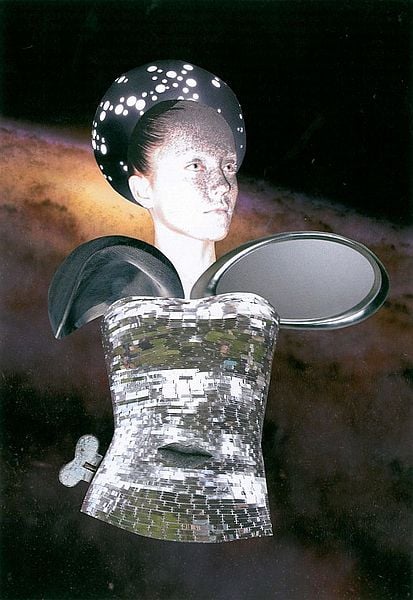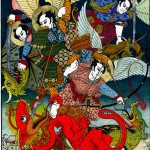Emails are coming in reporting a state of high tension on various Corapian threads, in anticipation of the Black Sheepdog’s “very special announcement” which is promised today.
You gotta give the Dog credit; he knows how to play to an audience and build up the suspense. I’m finding it kind of sad (and troubling) that so many people have made this one man such a huge part of their lives of faith.
And I am troubled, too, by our society’s seemingly endless appetite for high-drama and sensationalism — how so many are glued to their cable channels or their facebook pages, looking for something to become happy or hysterical about, as though we need the daily media-delivered drama in order to feel like we’re part of things, to feel like we’re real, anymore.
Or, for some, perhaps to feel anything at all.
 I confess, I do not follow sensational court dramas. Fixing my attention on any sort of serial is difficult, whether it’s “Breaking Bad” or the OJ Trial; after a while I tire of the teasing manipulation that is meant to keep one coming back for more. And when it comes to stories of murdered, missing or abused children, I simply don’t go there, because I can’t handle it.
I confess, I do not follow sensational court dramas. Fixing my attention on any sort of serial is difficult, whether it’s “Breaking Bad” or the OJ Trial; after a while I tire of the teasing manipulation that is meant to keep one coming back for more. And when it comes to stories of murdered, missing or abused children, I simply don’t go there, because I can’t handle it.
So, when I read an angry facebook post as the verdict broke: “Casey is not guilty, WTF?” I really wasn’t up on the details, and I’ve chosen not to read much about it. I think sometimes, we’re so trained by media that we forget we can choose not to follow a story. We can refuse to obediently fix our attention where directed, if we really want to.
 Today, though, Timothy Dalrymple’s piece spoke to me, because it is such an honest attempt to understand those two great imponderables: face of evil and the mercy of God:
Today, though, Timothy Dalrymple’s piece spoke to me, because it is such an honest attempt to understand those two great imponderables: face of evil and the mercy of God:
“. . .the really hard thing to explain was why the wicked prosper.
We wrestle a lot with: Why does God let bad things happen to good people? The ancients – who rarely saw people as truly good, in any case, but who saw plenty of instances of extraordinary wickedness – wrestled a lot with: Why does God let good things happen to bad people? We don’t seem to feel the pinch of this question today — except perhaps in moments like this, when the blood of the innocent cries out for justice.”
It is a good piece and I hope you’ll read it all, but there really is no mystery as to why the wicked prosper, at least not these days: they prosper because we are an idolatrous society that cannot get enough of whatever we have fixated on.
Max Lindenman (who has an additional perspective on the Corapi story here) looks at the high-anxiety of the self-described “Corapians” and wonders why the world loves a ham: 
On meeting someone for the first time, I ask myself, “What are this person‘s ego needs? What does he want for himself?” One motive is simple curiosity; for most people, “I want“ and “I am“ are one and the same, or at least very close. Another motive is enlightened self-interest: knowing how to make a person happy means knowing how to make him like me. [. . .]
This, I think, goes a long way toward explaining the allure of the showboat evangelist. At some level, audiences recognize that he wants something. His goals may not be as venal as Corapi’s have turned out to be; he may simply crave applause, or enjoy the sound of his own voice. He may be after some wholly respectable reward, like the comfort that comes from connecting with — and belonging to — a great mass of people. Even when people aren’t consciously aware of the need, they respond to it — in the best cases by offering their hearts; in the worst, their money.
Well, that’s one theory. Another is, people want to see themselves and their thoughts reflected in an attractive, articulate, charismatic person, and when they find it, they feel a connection that is mostly an illusion, but which they want to be real; and they help the connection to become more real by making purchases, subscribing to newsletters and joining fan pages. It feels like being an insider, and most everyone wants to be an insider, somewhere, right?
 I can’t help but think back to the days when I would be all-undone in anticipation of some news about Bobby Sherman or David Cassidy. My world turned on the good or the bad, to a very unhealthy degree, but then again, I was just a kid, and I wanted to feel like I belonged, too — like I had some special understanding of them and their lives. Like I was an insider.
I can’t help but think back to the days when I would be all-undone in anticipation of some news about Bobby Sherman or David Cassidy. My world turned on the good or the bad, to a very unhealthy degree, but then again, I was just a kid, and I wanted to feel like I belonged, too — like I had some special understanding of them and their lives. Like I was an insider.
When that desire for outside validation and for inclusion gets served, then we find our idols, and this is true in all spheres, entertainment, sports, politics and religion.
Maybe I’ve become a cynic — I probably am, and that is no good thing, because cynicism is too easy and it becomes it’s own kind of idolatry — but I just can’t get worked up about any public figure, these days. Even the pope, as much as I honor and revere him and frankly love his shy, avuncular style, doesn’t get me fluttered up with each pronouncement.
It could just be that I am cold-hearted, so I don’t want to gainsay others. But it still makes me sad to see people breathlessly awaiting anything — except, perhaps, an election outcome, either secular or sacred.
Related:
O Season of Idols
The Toxicity of Idolatry
Idols don’t like not being idolized











